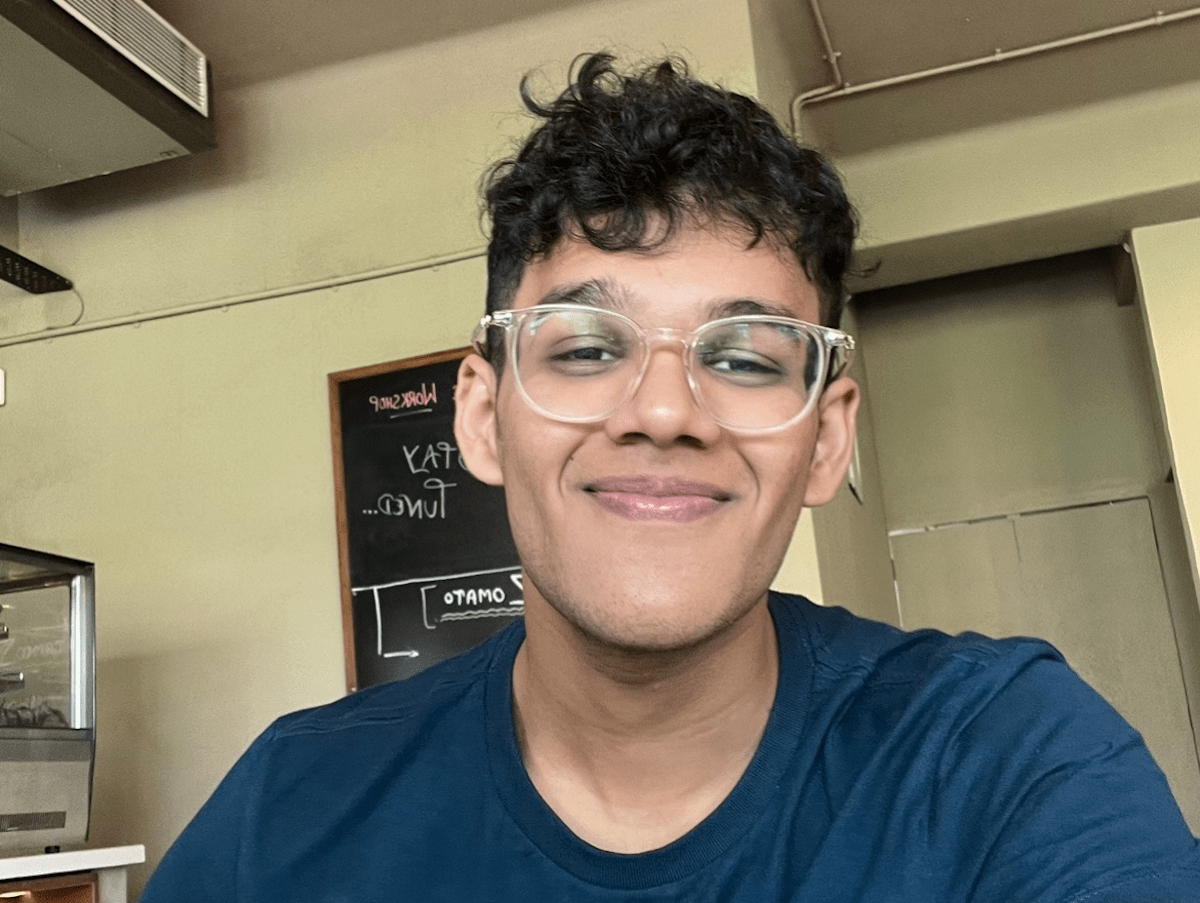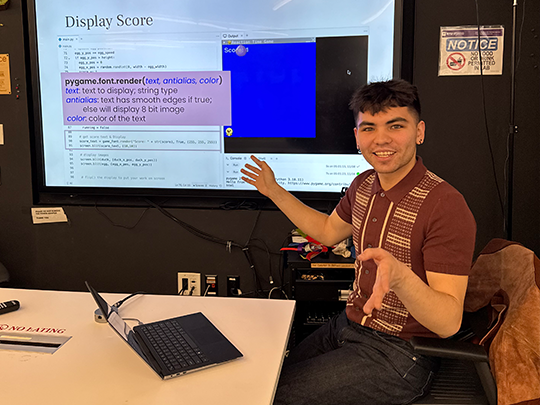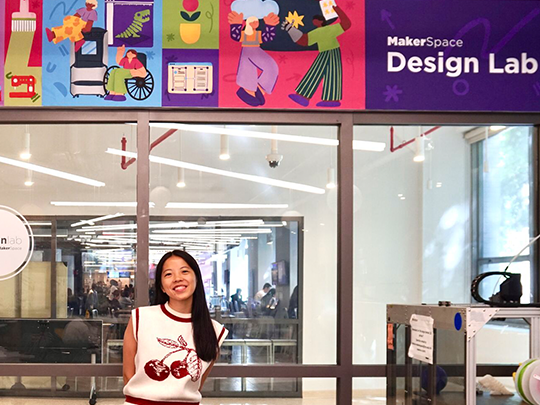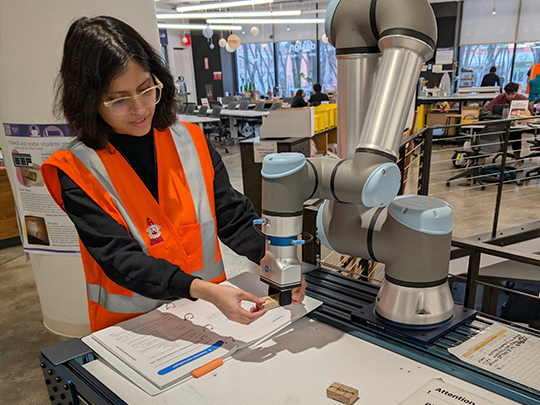For graduate students, working at the NYU Tandon MakerSpace means being a teacher, mentor, and inspiration

NYU Tandon opened its 10,000-square-foot MakerSpace at 6 MetroTech in 2016, and since then, dozens of team leads, teaching assistants, graduate assistants, and coordinators have helped visitors navigate the plethora of 3D printers, powerful laser and water-jet cutters, and other equipment. Students fill those coveted positions, and most report that working at the MakerSpace is much more than just a student job: as the undergraduates we profiled last year attested, it can be a pathway to self-confidence, learning, personal growth, and a sense of community.
This year, we caught up with a group of graduate students to find out how helping others tap into the Maker Movement has impacted their own academic journeys.
“Progress in the lab is usually incremental, so as a researcher you might wait your entire career for a significant breakthrough,” Elizabeth Waters, the director of the MakerSpace and Experiential Learning Center, says, “but when you help a student, you can see immediately that you’ve made an impact. That’s enormously gratifying for a graduate student, many of whom ultimately want to teach or manage a team in addition to their research.”
 Alpesh Ranjan
Alpesh Ranjan
Management of Technology
Q: How did you first get interested in STEM subjects?
A: There's a story there. I had always loved gaming and things like that, but when I was in 12th grade, I was introduced to programming. Machine learning and AI were becoming major topics of discussion, and I was intrigued by just how much computers were capable of. I was sure I wanted to pursue computer science and engineering throughout my life, and that’s what I studied as an undergraduate in Mumbai.
I worked at various jobs after that, but I began to feel stuck; I was making career progress but didn’t feel that I was growing personally. I ultimately decided to get a graduate degree and expand my horizons.
Q: Why did you choose Tandon?
A: I was also admitted to University College London, but everyone knows New York City is the center of the world, and NYU is the center of New York City. I’m focused on blockchain technology, because that’s the area I’ve enjoyed most in computer science over the last several years.
Q: What made you apply for a job at the MakerSpace and what are the best parts of working here?
A: On a practical level, I have a lot of classes in 6 MetroTech and 2 MetroTech, so it’s very central, but that’s not the major consideration. This is one of the coolest spots at Tandon, and it draws a varied crowd, including creative design people. It’s impossible not to be intrigued by all the projects going on here. I’m working to improve the Web Checkout system right now, but I’m still going over to see what people are working on and how they’re going about it.
 Kyle Six Lim
Kyle Six Lim
Computer Engineering
Q: How did you first get interested in STEM subjects?
A: My mom first introduced the idea to me. She started out as a software engineer, moved into software management, and has been involved in big tech ever since. I was always impressed and considered it a high-powered career. Later, my older brother studied robotics and aeronautical engineering, and he ended up working for NASA.
I, on the other hand, grew up doing performing arts and musical theater. I studied ballet when I was young and appeared in a local production of The Nutcracker. There came a time in high school when even though I loved music and dance, I was unsure about performing for a living. Inspired by my family, I took a programming course in community college. It was an intro C++ course taught by a professor old enough to remember when C++ was invented!
I found myself looking forward to homework assignments; they were like interesting, little puzzles, and I turned out to be good at them. I ended up getting an A+ in the class and began thinking this was something I could actually do to make a good living. Not only that, but it was creative: I might not be performing on a stage, but I could be a creative problem-solver.
Q: What motivated you to go to graduate school, and why did you choose Tandon?
A: First of all, I love academics; I love being in school. I always know I would want to earn at least a master’s degree. I had been focusing on computer science, but now I really wanted to get my hands dirty. I considered robotics but ultimately decided on computer engineering. If computer science is one side of a coin, computer engineering is sort of the other side, working with hardware and learning how things actually translate into electrical signals.
Since my performing arts days, I had wanted to move to New York City, so Tandon was a natural choice for me.
Q: Now that you’re working at the MakerSpace, do you have a favorite project you’ve worked on?
A: That’s a hard question because they’re like my children: I love all my projects equally.
Still, if I had to give you an answer right this minute, I’d say the solar panel charging station I helped build as part of the MakerSpace Sustainability Team. We found a use case for it, presented it at a poster session, and it’s at a stage where it’s now actually being used to charge devices. I really enjoy when people are touring the MakerSpace and I see it being pointed out. I’m really proud that my team contributed to the space in that way!
 Thao Chi Vu
Thao Chi Vu
Integrated Design & Media
Q: Can you trace back to when you first became interested in design and technology?
A: I was always considered a creative arts person, and then during my undergraduate years I started taking some business classes and getting in touch with user-experience research. I realized it felt more meaningful than any other work that I’d done before. I saw that I could use science to back up my design and visual arts. It made sense to gather quantitative and qualitative data about how people are responding to your designs and the user experience.
Q: Now that you’re working at the MakerSpace, do you have a favorite project you’ve worked on, or one that you feel has made a great impact?
A: I did a branding project for the Design Lab and MakerSpace that I really enjoyed working on, particularly the mural, which had the goal of representing our students and the work that happens here. The visual language that we developed is part of an effort to make the space more welcoming, so more people want to be here.
Q: What advice do you give someone thinking of coming to Tandon?
A: You should be really clear about what you want to learn, because your time here will fly by so fast. Make that your Northstar, because there will be periods when you are so deep in the thick of things that you lose sight of why you are here in the first place. I’ve had times when I’d get lost in the weeds of assignments and submitting homework and forget that I still needed to pay attention to personal projects that would develop the skills I was learning or go to a club meeting and make connections.
I came to Tandon to learn more about accessibility, but I’ll leave with a lot more than that. I was very focused on digital accessibility, but I also got a more comprehensive understanding of what design means, including aspects like assistive tech and physical fabrication. A lot of that happened in the MakerSpace.
 Neha Navarkar
Neha Navarkar
Mechatronics
Q: How did you first get interested in STEM subjects? Was there someone who inspired you?
A: My father was a role model, and I have two brothers who are both engineers. I used to hang out with them a lot, and they loved movies like Transformers and The Avengers, and they were fans of video games, so watching them gave me the idea that I should consider getting into similar things.
Q: What did you study as an undergraduate, and what motivated you to go to graduate school?
A: I studied telecommunication engineering, and during that time, I joined a robotics club. That experience convinced me that I should be doing something specific to that field, so that’s why I had the idea to apply for a graduate program. I had some electronics experience, but I needed mechanical and computer engineering experience.
I was admitted to multiple schools, but NYU had the program that best matched my interests.
Q: What have you enjoyed about your time working at the MakerSpace, and is there anything you’ve completed that you are particularly proud of?
A: I get to work on a lot of machines that I never imagined using, and I also love training people. My speciality is the robotic arm, so I especially love helping people use it.




